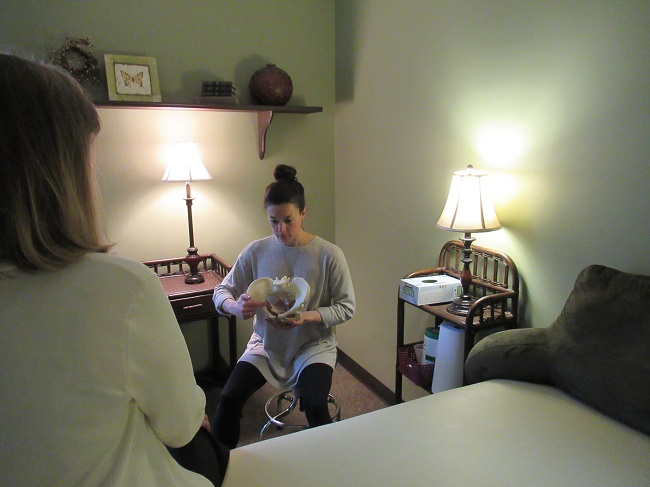
Phoenix Physical Therapy Offers a Niche Practice for Incontinence and Pelvic Floor Muscle Dysfunction
In 2001, physical therapist Jane Kaufman started Phoenix Physical Therapy, PLC. The practice is devoted to types of impairments that are rarely discussed; specifically pelvic floor muscle dysfunction and incontinence. Kaufman is board certified by the Biofeedback International Certification Alliance in Pelvic Muscle Dysfunction (BCB-PMD) and today, Phoenix Physical Therapy specializes in treating patients of all ages who experience these embarrassing and debilitating issues.
Kaufman cited statistics indicating that over 50 percent of people aged 65 and older living at home reported bladder and/or bowel incontinence and she noted that this can lead to depression, risk of falling on the way to the toilet, social isolation, skin irritation, and numerous psychosocial problems. These issues are not restricted to seniors. According to HealthDay News, over 25 million Americans admit to regularly having issues controlling their bladders.

Typical challenges for Kaufman’s patients include urinary urgency and frequency, incontinence, difficulty voiding or moving bowels, constipation, pelvic pain, painful bladder syndrome, frequent urinary tract infections, prostatitis, and other challenges related to pelvic floor muscle dysfunction. Phoenix uses a non-surgical technique designed to help patients live happier, more productive lives. “Our goal is to empower each individual who comes to our office with the skills and training to eliminate this embarrassing and life altering problem,” Kaufman said. “You know patients are pleased with the results when they refer their spouses, children, grandchildren and friends.”
As Kaufman’s reputation for care grew, her practice grew, as well, and now includes four pelvic floor therapists and an office manager. In addition to treating patients, Kaufman teaches courses to healthcare providers throughout the country in person and via telehealth, and mentors others worldwide as they work toward their certification in this treatment.
Located in South Burlington, Phoenix attracts patients from across Vermont, western New Hampshire and northern New York. Physicians from major metropolitan medical centers have referred patients to the practice. Kaufman said the comfort they offer patients makes the business seem more like a medical spa than a typical clinic.
While other physical therapists treat a variety of conditions, Phoenix’s only focus is the treatment of pelvic floor muscle dysfunction, working with clients across the age spectrum from small children to patients in their 90’s. Clinicians work with patients in a one-on-one partnership through a series of steps that Kaufman said results in a substantial and often complete improvement of their condition.
Kaufman notes that pelvic floor problems are intimate issues, shared reluctantly, if at all, with others, including patients’ own physicians and families. “These issues generally cause embarrassment, confinement, and discouragement, and can become quite debilitating,” she said. “They create a self-imposed burden on one’s life. Through appropriate physical therapy intervention with a highly skilled and caring therapist, the results are quite successful without surgery.” Kaufman said the issues faced by her patients tend to be underreported, underdiagnosed and undertreated. “Many people, especially the more mature population, are just too embarrassed to mention this to a physician,” she said.

Kaufman believes many older adults think incontinence is a normal part of aging but she assures them that this is not the case and that treatment options other than surgery and/or medication exist. Common problems for mature adults include, but are not limited to, urge incontinence which is a strong urge to void and not being able to get to the toilet in time, nocturia which is using the bathroom more than twice a night, and stress incontinence associated with leakage from sneezing, coughing, laughing, or lifting. The leakage can be in the form of solid or liquid matter or both and Kaufman said that having more than one of these issues is common. Other problems for the mature population which she said are rarely discussed include withholding waste to avoid use of toilets and dyspareunia which is discomfort during sexual intercourse. “These issues are especially challenging for mature adults to discuss with a healthcare provider,” she said “but the Phoenix physical therapists are acutely aware of them and provide the compassionate, discrete care necessary to help overcome these life altering issues.”
Treatment by Phoenix staff includes the use of small sensors to teach patients how to visualize the muscle associated with incontinence, dysfunction, pain, or discomfort. Computer software captures the body’s signal and provides information to the therapist and the patient. The root of these problems is the pelvic floor muscle which releases in an untimely manner to eliminate body waste, thus creating incontinence. By changing the function of this muscle and teaching the patient a variety of strategies for self-management, the symptoms can often be resolved. Treatment for dyspareunia involves specific gentle stretches as well as muscle visualization to release the tone in the muscle for improved relaxation and function.
“Phoenix sends patients back into the world they are accustomed to, empowered with newfound confidence and a package of life-long skills to manage their incontinence, pelvic pain, and/or pelvic floor muscle dysfunction,” Kaufman said. “While the treatment is based on highly refined scientific methodology, it is the environment of a trusting partnership that enables the patient to take charge and believe, ‘yes I can do this!’ Overcoming pelvic floor problems is a personal issue. By working together as a patient/clinician team, the majority of patients are pleased with the outcomes.”
“The work we do gives us real pleasure,” Kaufman said. “I love what I do from multiple perspectives. I can help change someone’s life in a really positive manner in a way that most health care providers can’t or don’t.” Kaufman said the name Phoenix was chosen because it connotes rising from the ashes. “People say they are too embarrassed to leave their houses,” she said “but after coming to us, they’re able to go out and go dancing again. We improve their quality of life. There isn’t a day that goes by that we don’t make a big difference in someone’s life and that feels really good.”
Patients interested in treatment must be referred by a physician but can call the office at 802-863-6662 or use the “contact us” portal at Phoenixpt.com to schedule an appointment. They accept virtually all medical insurances.
Related Articles & Free Vermont Maturity Subscription

Making the Most of a Telehealth Appointment
Understanding & Solving Chronic Shoulder Pain


Comment here